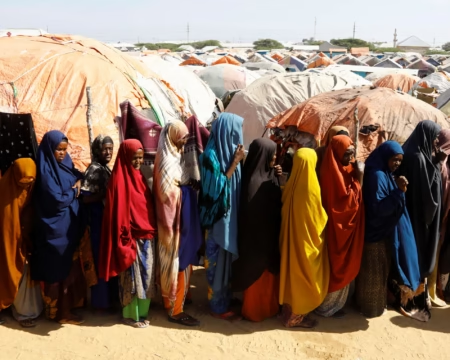Despite nearly two decades of military involvement, the U.S. continues to face setbacks in its efforts to contain al-Shabaab in Somalia.
U.S. Embassy Debate Highlights Deeper Issues
The U.S. government is considering closing its embassy in Mogadishu, Somalia. This news comes after recent advances by al-Shabaab militants in the region. Some U.S. officials fear another foreign policy disaster like what happened in Afghanistan in 2021.
While the talk of shutting the embassy grabs attention, the real issue lies in a deeper problem. For almost 20 years, the U.S. has used military force to fight al-Shabaab. Still, the group remains strong.
Comparing Somalia and Afghanistan
Many are quick to compare Somalia to Afghanistan. But the U.S. role in these two countries is very different. In Afghanistan, the U.S. once had over 100,000 troops. In Somalia, there are only 500 to 600 U.S. troops. These soldiers focus on support, training, and drone operations.
Most of the fighting on the ground is done by Somali forces or troops from African countries. The U.S. has helped train an elite Somali unit called Danab, which has 3,000 to 5,000 soldiers. America also used to support the African Union (AU) mission in Somalia. That mission had 22,000 troops at its peak.
Now, the U.S. is cutting back its financial support for the AU. The future of the new AU Support and Stabilization Mission is unclear.
Turkey’s Growing Role in Somalia
The U.S. is not the only outside force in Somalia. Turkey has become a major partner for Somalia. It has the largest embassy and military training center in Mogadishu. Turkey trains Somali troops in a camp called TURKSOM. These forces, known as Gorgor, work alongside Danab to fight al-Shabaab.
Recently, Somalia’s President Hassan Sheikh Mohamud visited Turkey twice. Reports say he signed deals to let Turkish forces play a bigger role in helping Somali troops fight al-Shabaab.
If the U.S. embassy pulls out, Turkey may step in even more. Turkey’s influence in Somalia’s security could grow.
Drone Strikes and Military Solutions
The U.S. is still using drone strikes to target al-Shabaab. But many wonder if this tactic is working. After all these years, al-Shabaab still controls territory and carries out attacks.
The real question is: why hasn’t the U.S. strategy worked?
One answer is that Somalia’s government is weak and depends heavily on foreign help. Since 2009, many foreign powers, including the U.S., have supported a plan to build up the Somali state. The goal was to create a strong, fair government that could win the support of the people.
But that hasn’t happened.
Why the Somali Government Struggles
Somalia’s government often focuses more on getting foreign aid than serving its own people. Many leaders are more concerned with power, money, and deals with donors. Local people see the government as distant and corrupt.
Instead of building good schools, clinics, or roads, the government has created a system based on loyalty and clans. Most decisions are made by elite groups, not by those who live in the affected areas.
As a result, people don’t trust the government. This opens the door for groups like al-Shabaab to gain support.
al-Shabaab’s Surprising Tactics
Al-Shabaab is known for its violence, but it also knows how to connect with people. The group uses Somali poetry and other cultural tools to spread its message. It has adjusted its approach in recent months.
There are reports that al-Shabaab is offering peace to government troops who surrender. Some say they are even promising no revenge against those who switch sides. While many still fear the group, this softer strategy may win over some communities.
Time to Rethink the Strategy
If the U.S. closes its embassy in Mogadishu, it won’t fix the deeper problems. A drone strike campaign alone won’t defeat al-Shabaab. The root issue is the failure to build a strong, trusted Somali government.
The U.S. and its allies need to focus more on political solutions. That means helping Somalia create a government that listens to its people and provides real services. Without that, no amount of military power will bring lasting peace.







